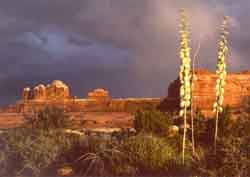 NATURE
HAPPENINGS - JUNE 2001
NATURE
HAPPENINGS - JUNE 2001
The Phlegm Serpent
by Damian Fagan
 Ever
since Adam and Eve, snakes have gotten a bad rap. Even Noah, the
bearded gentlemen, left snakes off the guest register when the Ark
set sail. Snakes are the Rodney Dangerfield’s of the reptilian
world - they don’t get no respect. So it is no wonder when
a snake is sighted most people run for a shovel.
Ever
since Adam and Eve, snakes have gotten a bad rap. Even Noah, the
bearded gentlemen, left snakes off the guest register when the Ark
set sail. Snakes are the Rodney Dangerfield’s of the reptilian
world - they don’t get no respect. So it is no wonder when
a snake is sighted most people run for a shovel.
As the warm weather melts away the cool of Spring, snakes emerge
from their winter hibernation and disperse. It Is a wondrous sight
to see a ball of snakes emerging from their winter den, all tangled
together like a ball of yarn. As each snake’s body draws more
heat from the environment, the snakes peel off into separate individuals.
The party is over for these communal winter den mates, with rattlesnakes,
racers and whipsnakes going they separate ways.
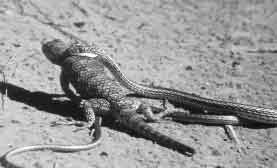 Some
common snakes in Canyon Country are western terrestrial garter snakes,
midget-faded rattlesnakes and gopher or bull snakes. Of the three,
the rattlesnake is the only representative Viperidae, or Pit Viper
Family. And no matter what any guide says on a river or jeep trip,
rattlesnakes are not encouraged to coil up on your sleeping bag
drawn there by the steady rhythm of your heartbeat, so stop sleeping
on the roof of your car.
Some
common snakes in Canyon Country are western terrestrial garter snakes,
midget-faded rattlesnakes and gopher or bull snakes. Of the three,
the rattlesnake is the only representative Viperidae, or Pit Viper
Family. And no matter what any guide says on a river or jeep trip,
rattlesnakes are not encouraged to coil up on your sleeping bag
drawn there by the steady rhythm of your heartbeat, so stop sleeping
on the roof of your car.
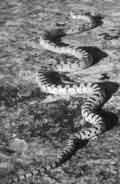 The
later two are members of the Colubridae or Colubrid Family. Colubrids
are common, generally harmless snakes found on all continents of
the world, except Australia. Members of the group can be found from
sea level to 9,000', and in habitats as diverse as lowland wetlands
to coniferous forests. One noted feature of this group is that many
Colubrids slip into burrows and crevices or may climb trees and
sandstone ledges in search of prey.
The
later two are members of the Colubridae or Colubrid Family. Colubrids
are common, generally harmless snakes found on all continents of
the world, except Australia. Members of the group can be found from
sea level to 9,000', and in habitats as diverse as lowland wetlands
to coniferous forests. One noted feature of this group is that many
Colubrids slip into burrows and crevices or may climb trees and
sandstone ledges in search of prey.
 The
gopher snake (Pituophis melanoleucus) is so named because of its
habit of exploring burrows and dining on pocket gophers. When irritated,
the one-lunged gopher snake lets out a sinister hiss that is produced
by air expelling past a special membrane on the epiglottis. Perhaps
that is why they are in the genus Pituophis, which means “phlegm
serpent.”
The
gopher snake (Pituophis melanoleucus) is so named because of its
habit of exploring burrows and dining on pocket gophers. When irritated,
the one-lunged gopher snake lets out a sinister hiss that is produced
by air expelling past a special membrane on the epiglottis. Perhaps
that is why they are in the genus Pituophis, which means “phlegm
serpent.”
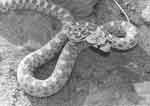 The
gopher snake’s body is a yellow or cream-colored background
blotched with dark brown or black spots. This pattern enables the
gopher snake to blend into its surroundings. But when its four-foot
body tries to cross the pavement - watch out. Soaring red-tailed
hawks and road hunting kit foxes or coyotes have been known to pick
off these slithering denizens of the desert. Some nights, when I
was rangering at Arches National Park, I’d catch a kit fox
in my car’s headlights as it scooted across the road dragging
a lifeless snake.
The
gopher snake’s body is a yellow or cream-colored background
blotched with dark brown or black spots. This pattern enables the
gopher snake to blend into its surroundings. But when its four-foot
body tries to cross the pavement - watch out. Soaring red-tailed
hawks and road hunting kit foxes or coyotes have been known to pick
off these slithering denizens of the desert. Some nights, when I
was rangering at Arches National Park, I’d catch a kit fox
in my car’s headlights as it scooted across the road dragging
a lifeless snake.
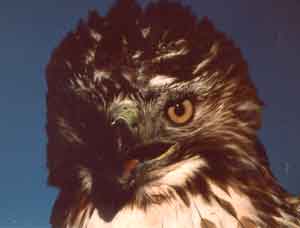 Gopher
snakes are tough creatures, but sometimes they need to rely on mimicry
to get themselves out of tight spots. When really agitated, the
snake will coil itself up, hiss and vibrate its tail - too bad there
aren’t any rattles on the end. With a somewhat triangular-shaped
head, reminiscent of the vipers, the gopher snake fools the unsure
predator with its behavior. Maybe the predator backs up to think
the situation over, and this brief pause may provide the snake with
the opportunity to escape.
Gopher
snakes are tough creatures, but sometimes they need to rely on mimicry
to get themselves out of tight spots. When really agitated, the
snake will coil itself up, hiss and vibrate its tail - too bad there
aren’t any rattles on the end. With a somewhat triangular-shaped
head, reminiscent of the vipers, the gopher snake fools the unsure
predator with its behavior. Maybe the predator backs up to think
the situation over, and this brief pause may provide the snake with
the opportunity to escape.
A lucky observer might catch two gopher snakes moving together in
a syncopated “dance” which may last for an hour. This
is not a courtship ritual between mates, but rather a combat engagement
between rival males that features head rearing, hissing, slithering
with upraised heads and Grecian wrestler moves. Often the snakes
are so absorbed in their activity that they fail to notice the onlookers,
two-footed or four. Not a good practice considering the reputation
these reptiles bear on their small shoulders.
© 2001 Moab Happenings. All rights
reserved. Reproduction of information contained in this site is
expressly prohibited.